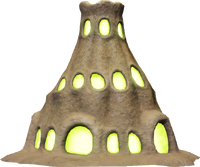Lumiknoll
| Lumiknoll | |
|---|---|

| |
| Appears in | Pikmin 4 |
| Scientific name | Collux aeternium |
| Family | Unknown |
| Areas | Sun-Speckled Terrace, Blossoming Arcadia, Serene Shores, Hero's Hideaway, Giant's Hearth, Primordial Thicket |
| Caves | None |
| Dandori Challenge levels | None |
| Dandori Battle levels | None |
|
This article is a stub. You can help Pikipedia by expanding it. |
Lumiknolls (ヒカリヅカ?, lit.: "Light Anthill") are large dirt mound nests found in night expeditions in Pikmin 4. They are the home to Glow Pikmin, and function similarly to the Onion, although their behavior is quite different.
Lumiknolls produce Glow Pikmin when fed with glow pellets; for every three pellets they are fed with, they will produce one Glow Pikmin. Unlike Onions, when Glow Pikmin are produced, they will automatically appear at the player character's location. Juvenile Lumiknolls, known as Tricknolls, are also found within night expeditions and serve as an extension of the Lumiknoll. All pellets transported to Tricknolls are then transferred to the main Lumiknoll and propagate Glow Pikmin.
During a night expedition, creatures will be attracted to the Lumiknoll and will try to destroy it; the player must subsequently either defeat all the attacking creatures or ensure that the Lumiknoll survives until the dawn. Occasionally, two Lumiknolls are present in an area at once- while they have separate health meters, the destruction of either Lumiknoll will cause the expedition to fail, so the player must work with Oatchi to ensure that both of them are kept safe.
When successfully protected, Lumiknolls produce an extract known as glow sap, which is used to cure castaways from their leafling affliction.
Naming
- Common name: Lumiknoll. It is a pun of "lumino-", Latin for small lights, and "knoll", a small hill.
- Japanese nickname: ヒカリヅカ?, lit.: "Light Anthill". This refers to how it emits light and how it looks like an anthill.
- Japanese name: トコヨノヒカリヅカ?, lit.: "Continuing All Night Light Anthill". It refers to how the Lumiknoll must be protected all night.
- Scientific name: Collux aeternium.
- Internal names:
WASURENAGUSA. - Prerelease: None.
Names in other languages
| Language | Name | Meaning | Notes |
|---|---|---|---|
| ヒカリヅカ? Hikaridzuka |
Light Anthill | From ヒカリ? (lit.: "light") and アリ塚? (lit.: "anthill") | |
(traditional) |
發光巢穴 Fāguāng Cháoxué |
Glowing Nest | |
(simplified) |
发光巢穴 Fāguāng Cháoxué |
Glowing Nest | |
| Gloeikolonie | Glow colony | ||
| Lumilière | Glowing Anthill | From "lumineux" (glowing) and "fourmilière" (anthill) | |
| Leuchtbau | Glow Burrow | ||
| Luminotana | Glowing Den | From "luminosa" (glowing) and "tana" (den) | |
| 빛둑 bitduk |
Light Anthill | From「빛」(light) and「개밋둑」(anthill) | |
| Lampireiro | Firefly Anthill | From "pirilampo" (firefly) and "formigueiro" (anthill) | |
| Lumiloma | Glowing Hill | From "luminosa" (glowing) and "loma" (hill) |
Trivia
- Lumiknoll's name could also be a pun on the chemical Luminol, used to detect trace amounts of blood in crime scenes. Like a Lumiknoll, Luminol emits a luminescent glow, although this glow is blue unlike a Lumiknoll's green.